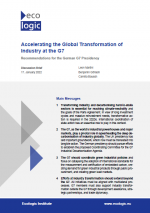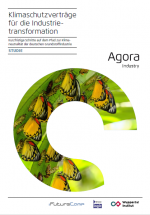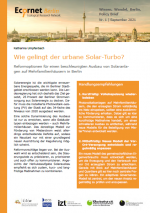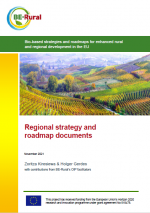Ecologic Institute Newsletter No 233 – February 2022
- Ecologic Institute Newsletter
Accelerating the Global Transformation of Industry at the G7 – Recommendations for the German G7 Presidency
Transforming and decarbonizing industry is essential for reaching climate-neutrality and the goals of the Paris Agreement. How can the G7 accelerate the decarbonization of industry? Ecologic Institute's policy brief maps out several opportunities and potential priorities for the German Presidency. The recommendations are available for download.
Carbon Contracts for Difference for a Transformation towards Climate Neutrality – Report
Basic industries need to transform towards climate neutrality. Carbon Contracts for Difference can be an important tool to accelerate investments into climate-neutral technologies, and to compensate for the additional cost burden of such technologies. This report by Agora Industry, FutureCamp and the Ecologic Institute takes a deeper look at Carbon Contracts for Difference – how they work, what their function should be, and how they can best be aligned with other policy instruments such as emissions trading. The report is available for download.
Advancing Multilateral Cooperation on Climate Action – Report
In 2022, there are several windows of opportunity for further advances in multilateral cooperation on the climate crisis, including in the G7 and G20 discussions, led by Germany and Indonesia, respectively. The new German government has reiterated its desire to create a new "climate club" in this context. This report by Ecologic Institute, Oeko-Institut and Climate Analytics contains several proposals for specific new initiatives that could be started. The report is available for download.
Synoptic Review of Carbon Removal Solutions – Report
Sucking carbon dioxide out of the atmosphere – 'carbon removals' – is essential to achieve Europe's 2050 net-zero climate goals. This report, in collaboration with Ecologic Institute, considers twelve nature- and technology-based carbon removal solutions, evaluating their climate mitigation potential and suitability for deployment across Europe. The report supports the European Commission's development of a certification mechanism for carbon removals. It's available for download.
A Review of Carbon Removal Certification Mechanisms and Methodologies – Report
The European Commission is developing a certification mechanism to incentivize the removal of carbon from the atmosphere. To support its development, this report reviews 24 existing carbon removal certification mechanisms and methodologies and identifies key lessons for mechanism design. Ecologic Institute led the work on the report, which is available for download.
Emission Trading and Regulation of Financial Markets – Report
In light of the financial and economic crisis, the EU has further developed and tightened its regulation of the financial market in Europe. This process has also had an impact on the actors in the European carbon market and their trading strategies. This final report brings together the results of three separate analyses. It's available for download.
Protected Area Management in the EU – Supporting the Advancement of the Trans-European Nature Network – Report
This report authored by Ecologic Institute aims to improve the knowledge base on different realities of national protected area management. Based on a semi-structured survey conducted in 12 Member States, the report showcases national approaches and practices as well as challenges and successes. It targets six policy areas, namely designation procedures, connectivity, transboundary cooperation, management effectiveness, other effective area-based conservation measures (OECMs) and conservation-related targets under the EU Biodiversity Strategy for 2030. While illustrating national progress and transnational synergies, the report also points out ongoing shortcomings, specifically in the fields of management effectiveness and OECMs. The report further outlines key success factors and provides best practice examples. It's available for download.
How to Kickstart an Urban Photovoltaic Surge? – Policy Brief
The state of Berlin and the federal German government have set ambitious goals for the expansion of photovoltaics (PV) by 2030. A study by Ecologic Institute examines proposals for the further development of PV expansion on apartment buildings and analyses solutions from Spain, the Netherlands and Austria. It shows that the two central goals – accelerating the PV expansion and involving residents – are in tension with each other, at least in the short term. The study recommends reviving full feed-in. Subsequently, it is necessary to develop a new model of on-site supply, to adapt it regularly and to initiate a dialogue on the further development of PV to building technology. The policy brief summarizes the core statements of the study.
Regional Bioeconomy Strategy and Roadmap Documents – Report
How to develop regional bioeconomy strategies and roadmaps by considering the available biomass and the ecological boundaries of the ecosystems? How to develop bio-based business models, create new jobs and increase the innovation capacity of all actors in rural areas? How to embed the strategy development in an inclusive and transparent co-creation process? Ecologic Institute's Dr. Zoritza Kiresiewa and Holger Gerdes address these questions and outline regional strategies and roadmaps to kick off the local bioeconomy in five European regions. The report is available for download.
Regionalization of the Food System – Podcast Series
In a series of four podcasts "Ernährungswende – Regional Gedacht", we discuss new cooperation models for sustainable land use and food supply in the urban-rural network as part of the KOPOS network project. The episodes are part of the "Knowledge for Future –The Environment Podcast", which regularly reports on sustainable management and climate protection policy in cooperation with Ecologic Institute and Detektor.fm. In addition to reports on activities of the KOPOS projects, experts talk about central topics of the food system transformation, such as regionalization, land use, supply chains and underlying political frameworks. The episodes are available on detektor.fm and on all popular streaming platforms (Spotify, Deezer, Apple Podcasts).
Strengthening the Fight Against Environmental Crime in NRW – Hearing
On 19 January 2022, Dr. Stephan Sina, Senior Fellow of Ecologic Institute, participated as an expert in a hearing of the Committee for Environment, Agriculture, Nature and Consumer Protection of the North Rhine-Westphalian Parliament on the motion of the parliamentary group BÜNDNIS 90/DIE GRÜNEN "Bekämpfung von Umweltkriminalität in NRW endlich stärken – Schwerpunktstaatsanwaltschaft und Koordinierungsstelle für NRW einrichten" (Drucks. 17/14258). Together with three other experts and the working group of the municipal umbrella organizations of North Rhine-Westphalia, he commented on the motion and answered questions from members of parliament. Stephan Sina's written statement is available for download.
Can Politics Stop Climate Change? – Interview
In June 2021, the German Federal Constitutional Court ruled that the national climate law was inadequate and needed to be amended. The German government reacted swiftly and increased the ambition of the emission reduction targets implemented in the climate law. In two episodes of the Fidelity Kapitalmarkt podcast, Benjamin Görlach (Ecologic Institute) and the podcast's host Carsten Roemheld take stock of the challenges ahead for German and European climate policy under the new German government. They discuss how the transformation to climate neutrality can be reconciled with industrial competitiveness and social fairness.
From the Perspective of a Microplastic Particle – Youth Photo Competition
With the photo competition "From the perspective of a microplastic" for children and young people aged 12 to 17, we want to take a closer look at the world of microplastics and shed some critical light on it. How and where is microplastic produced, and what effects does it have on our environment? Put yourself in the position of a microplastic particle and submit a story and a photograph of the world from this point of view! We welcome entries until 7 March 2022 and great prizes await the winners.
Concepts for a Sustainable EU Food System
On 26 January 2022, the European Commission published the report "Concepts for a sustainable EU Food System". It presents the results of a participatory process with 44 international participants who developed building blocks in accordance with the European Farm to Fork Strategy for the legislative framework for sustainable food systems, which is to be presented by 2023. The building blocks are a sustainability assessment framework, transparency, dealing with consequences of the transition, policy coherence and multi-level governance, and international trade. Stephanie Wunder (Ecologic Institute) participated in the process as a member of the multidisciplinary expert group.
International Fellow with a Focus on Health, Climate and Nature-based Solutions
In the context of our International Fellowship Program in Berlin, we are looking for an International Fellow with Focus on Health, Climate and Nature-based Solutions. The deadline for applications is 31 March 2022. We are looking forward to your application.
Financial and Project Accountant / Financial Data Steward
To support our team in Berlin, we are looking as soon as possible for a Financial and Project Accountant / Finance Data Steward. The deadline for applications is 18 March 2022. We are looking forward to your application.
Contents
- Publications
- Accelerating the Global Transformation of Industry at the G7 – Recommendations for the German G7 Presidency
- Carbon Contracts for Difference for a Transformation towards Climate Neutrality – Report
- Advancing Multilateral Cooperation on Climate Action – Report
- Synoptic Review of Carbon Removal Solutions – Report
- A Review of Carbon Removal Certification Mechanisms and Methodologies – Report
- Emission Trading and Regulation of Financial Markets – Report
- Protected Area Management in the EU – Supporting the Advancement of the Trans-European Nature Network – Report
- How to Kickstart an Urban Photovoltaic Surge? – Policy Brief
- Regional Bioeconomy Strategy and Roadmap Documents – Report
- Regionalization of the Food System – Podcast Series
- Presentations
- Strengthening the Fight Against Environmental Crime in NRW – Hearing
- Can Politics Stop Climate Change? – Interview
- News
- From the Perspective of a Microplastic Particle – Youth Photo Competition
- Concepts for a Sustainable EU Food System
- We are Hiring!
- International Fellow with a Focus on Health, Climate and Nature-based Solutions
- Financial and Project Accountant / Financial Data Steward





